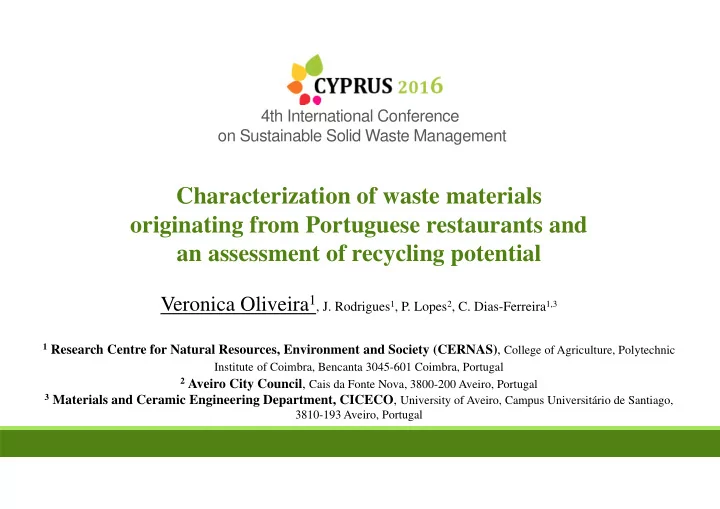

4th International Conference on Sustainable Solid Waste Management Characterization of waste materials originating from Portuguese restaurants and an assessment of recycling potential Veronica Oliveira 1 , J. Rodrigues 1 , P. Lopes 2 , C. Dias-Ferreira 1,3 1 Research Centre for Natural Resources, Environment and Society (CERNAS) , College of Agriculture, Polytechnic Institute of Coimbra, Bencanta 3045-601 Coimbra, Portugal 2 Aveiro City Council , Cais da Fonte Nova, 3800-200 Aveiro, Portugal 3 Materials and Ceramic Engineering Department, CICECO , University of Aveiro, Campus Universitário de Santiago, 3810-193 Aveiro, Portugal
Research questions How much waste is discarded by meal? What are the differences between restaurant waste and other municipal wastes ? 2
Waste collection in Portugal Household Restaurant Source segregated recyclables Unsorted fraction 3
Characterization campaign – September 2014 - City: Aveiro (78,000 pop.), Portugal - Restaurants: 11 - Sampling: Twice at each restaurant Aveiro - Types of waste: Unsorted waste Portugal and source segregated recyclables (paper, glass, metal and plastics) 4
Characterization campaign – September 2014 - door-to-door collection, using bags - Sorting: Manually by a team of 2-3 people - Categories: Organic matter, paper, plastic, glass, metal and others 5
Results – amount of waste collected Restaurant Waste (Own samples, 11 restaurants) Total waste collected 710 kg 197 kg Unsorted waste Source 28% segregated + Unsorted Source segregated 72% waste recyclables 514 kg 6
Results – Municipal waste Restaurant Waste National average, 2014 (Own samples, 11 restaurants) Source segregated recyclables 14% 28% vs. 72% Restaurants produce 86% twice as much recyclables as other municipal sources 7
Results – Total waste discarded by meal served 2,5 Total waste Kg waste per meal Range: 0.01 – 2.01 kg meal -1 Average 2,0 1,5 Average : 1,0 0.71 kg meal -1 0,5 only unsorted waste: 0,0 1 2 3 4 5 6 7 8 9 1011121314151617181920 0.5 kg meal -1 sample How do the figures compare to other works? 8
Results – Total waste discarded by meal served Range: 0.01 – 2.01 kg meal -1 Sustainable Restaurants Average : Association (2013, UK) 0.71 kg meal -1 0.48 kg meal -1 only unsorted waste: 0.5 kg meal -1 The amount of waste discarded by meal is similar in both studies 9
Results - characterization of unsorted waste Glass; 1% Metal; 1% Paper; Others; 11% 2% - 80% of unsorted waste Plastic; is organic matter 5% Organic matter; - 18% of unsorted waste 80% is easy to recycle 10
Results - characterization of unsorted waste Others Organic Metal; 1% Glass; 1% 29% matter Paper; Others; 36% 11% 2% Plastic; 5% Organic Glass matter; 6% 80% Garden Metal waste 2% Paper Plastic 2% 11% 14% Municipal Waste – Portugal vs Restaurant Waste (n=11) average. Source: APA 2014 11
Conclusions - 72% of restaurant waste is delivery as unsorted waste - 0.71 kg meal -1 is wasted - The composition of restaurant waste is different from municipal waste - Up to 18% of restaurant waste could be valued by recycling 12
Thank You! 13
Recommend
More recommend